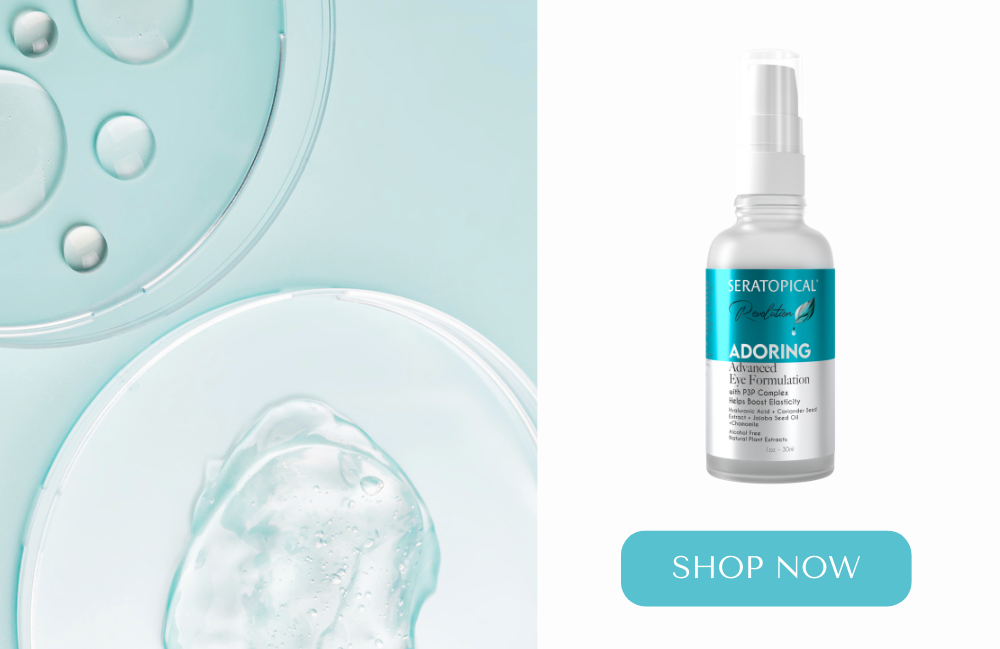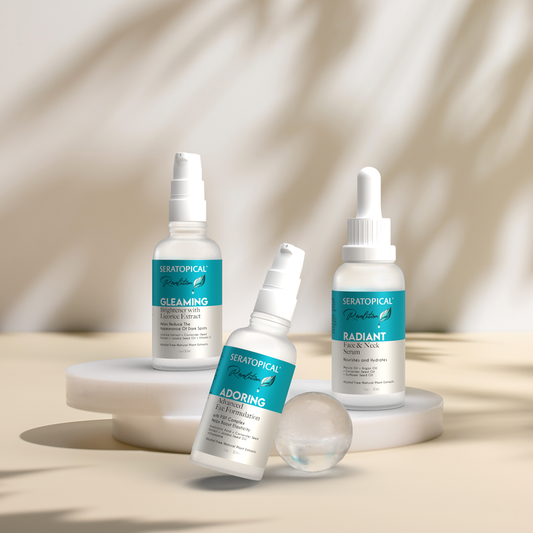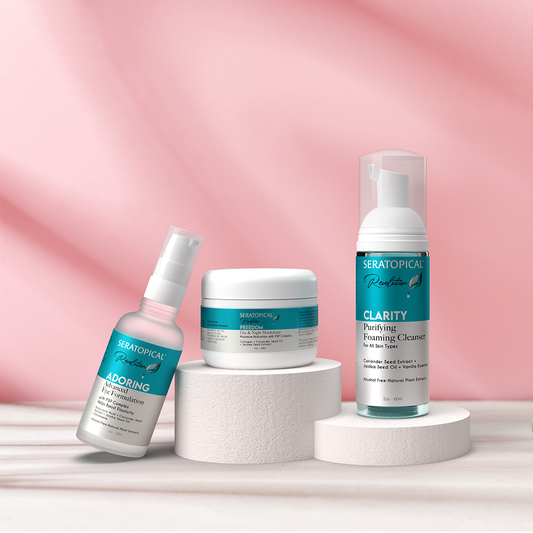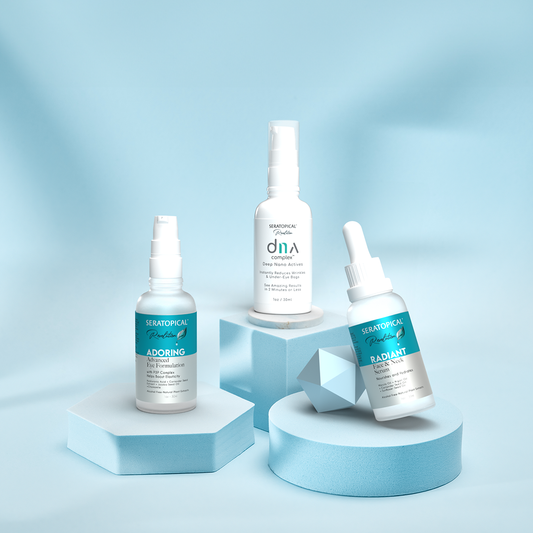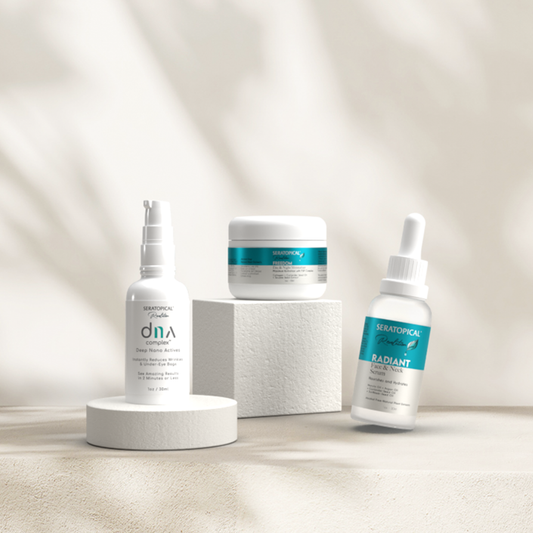What are serums and how can you incorporate them into your skincare regime? We all know the basics of an everyday skincare routine—cleanse, tone and moisturize. But with the use of serums in skincare for various skin types becoming increasingly popular - how do you know which serum to choose for your skin type, and then how do you incorporate the use of a serum into your existing skincare routine? Do you need one, or multiple facial serums? Do you need a hydrating serum, or do you require a complexion boosting serum?
There are just so many questions surrounding serums and the role that they play in a skincare routine. Let's take a look at what serums are, that some companies have a full line of serums, what potential benefits they may have for your skin, and how to incorporate them into your skincare routine.
When To Use Face Serums
Face serums are highly effective skincare products that can be used to address specific skin concerns and enhance overall complexion. They contain potent active ingredients in high concentrations, making them ideal for targeting specific issues such as fine lines, wrinkles, hyperpigmentation, or dryness. Face serums are most beneficial when used as part of a regular skincare routine after cleansing and toning the skin. They should be applied before moisturizer to ensure maximum absorption and efficacy. Whether you want to brighten dull skin, minimize the appearance of pores, or improve skin texture, incorporating a face serum into your skincare regimen can provide targeted benefits and help you achieve a radiant, healthy complexion.
Best Face Serums For Every Skin Type
Facial serums are typically lightweight liquids that may be found in small glass ampoules or glass dropper bottles. These liquids may hold potent vitamin levels and other possible active ingredients (depending on the type of serum), and may help with skin hydration and lines and wrinkles. Face serums may work well in conjunction with a specific night cream to assist in visible signs of aging. Dry skin can lead to wrinkles, and by simply replacing the moisture in your skin that is lost through environmental factors, or using the wrong skincare which we will discuss.
Skincare serum benefits may range from assisting with premature aging to potentially benefitting your skin's overall appearance and complexion. Commonly used serums may include hydrating ingredients such as hyaluronic acid which may provide a potent dose of hydration that may help to reduce fine lines and wrinkles that are sometimes caused by dry skin.
Hyaluronic Acid Serum
Hyaluronic acid is a naturally occurring sugar molecule in the body. Hyaluronic acid may be used in hydrating serums to help reduce visible signs of dehydrated skin. A dose of hyaluronic acid may help to provide moisture and hydration to the skin's surface. The addition of a hyaluronic acid serum is great for all skin types, absorbs quickly, and because it’s a humectant work relatively fast making your skin look dewy.
Vitamin C Serum
Vitamin C is a common vitamin that we know to include in our diet as part of a healthy lifestyle, and is one of the many vitamins that may help support your immune system. Vitamin C's role in skincare has become increasingly popular as the benefits for skin may help with skin tone and texture, skin hydration, and may help with visible signs of aging. Vitamin C is an incredible antioxidant that can be found in many anti-aging serums or on its own, and may help to reduce fine lines and wrinkles. Most skin types may possibly benefit from a targeted serum with ingredients such as Vitamin C serum to help brighten skin and help to create a smoother skin tone and texture. Skin types such as oily skin types, combination skin, and dry skin types may all benefit from the addition of Vitamin C serums to their daily routine.
Using a Hydrating Serum with Oily Skin
The way in which oily skin responds to moisture is not always straightforward. People who have oily skin types may lean towards products without excess oil or excessive hydrating properties to ensure their skin’s oil production is reduced. Some troublesome oily skin concerns may however, be aggravated by dehydrated skin and a hydrating face serum may help to improve these skin concerns if this is the case. Serums may help to assist in replacing lost moisture and hydration without adding excess oil to the skin barrier or creating clogged pores. This may be an ideal solution for people with this skin type as it may help to improve uneven skin tone while addressing the hydration of the skin barrier. People with oily skin may want to choose a lightweight hyaluronic acid serum that won’t clog pores or leave heavy residue while still providing a gentle moisturizing action.
Face Serums For Sensitive Skin
A sensitive skin type may cause a person to become overly cautious as to what they use on their skin and how they create their daily skincare routine, and rightfully so. A face serum added to your daily skin care routine might provide your skin with the necessary vitamins and nutrients while avoiding any potential skin concerns. A serum formulated specifically for sensitive skin, such as a hyaluronic acid, Vitamin C, or Vitamin E may soothe oily skin while providing your skin with the hydration.
A person with a sensitive skin type may need to be more cautious with active ingredients contained in a face serum such as Retinol or Vitamin A that may be commonly be found in an anti-aging serum. These active ingredients may be less tolerable for skin that is sensitive and dry and could lead to aggravating skin concerns further. It's always advisable to be more cautious with ingredients and products if you have a sensitive skin type. Checking the ingredients label on products for active ingredients that could be less tolerable for your skin is ideal. Alternatively, consulting a skincare professional is another option to consider.
Face Serum For Combination Skin
A combination skin type is typically one that has an oily T-zone across the forehead and down the nose to the chin, and has dry skin dry skin on the cheeks or skin across the cheekbones. This skin type may make choosing the right face serum to add to your skincare routine a little trickier as you don't want to add more oil to the T-zone sections of the face, while contributing moisture to the dryer skin. Where the skin is dry, it's advisable to be cautious with regards to what ingredients and skin products are applied to the sensitive skin areas. It’s important to choose a serum that will benefit both oily and dry skin, serums that won’t clog pores, and may be water-based and lightweight. A benefit for combination skin maybe exfoliating or using a cleansing brush on T-zone areas before applying skincare.
Face Serum For Mature Skin
Mature skin types or skin that is showing signs of aging , such as fine lines and wrinkles, could benefit from the addition of a hydration serum or a serum with anti-aging ingredients. A gentle cleanser, a balanced toner, a well-suited serum, and a good evening moisturizer may be the perfect daily regime for mature skin types. Mature skin types may also benefit from use of a facial serum containing Vitamin C, Green Tea Extract, Coriander Seed Oil, or Glycolic Acid to give your skin a glowing, younger look. Hyaluronic acid is considered the queen in skin plumping which may give the skin a reduced look of fine lines and wrinkles.
Eye Serums
There are also serums for the fragile eye area. As most of us already know, our eyes are the first area on our face that may exhibit excessive dryness, fatigue or age. An eye serum such as the Seratopical Revolution Adoring Eye Serum contains the gentle yet hydrating ingredient. It includes a triple peptide P3P delivery system designed to moisturize, restore, and nourish the skin. This serum is also loaded with powerful ingredients such as Coriander Seed Oil, Jojoba Oil, Cranberry Seed Oils, Hyaluronic Acid and antioxidant and skin-soothing ingredients. This serum may help to hydrate and protect the delicate area of skin around your eyes, helping to reduce the signs of aging. Let your eyes tell a story with Seratopical Revolution by SeraLabs featuring plant-based, alcohol free ingredients.
How To Use Face Serums
Serums tend to come in small glass ampoules or glass dropper bottles. They are meant to be used in small amounts as a little goes a long way. Remember that a serum is a potent, lightweight liquid that is meant to be used in small doses, or follow the usage guidance on the label. Serums may typically be applied between cleansing and your face cream day and night. Depending on the ingredients in your face serum, this may determine whether you apply your face serum in the morning or at night - or both. Certain ingredients should only be applied to your face at night time, and others may be applied morning and night time. It's best to follow the guidance on the product that you are using. Typically, the process is: 1. Cleanse, 2. Tone, 3. Apply serum (here you may apply multiple serums if they do not counteract each other) waiting a few minutes between each application to ensure the product has dried), 4. Apply moisturizer.
Seratopical Revolution Radiant- Face & Neck Serum
Another serum from SeraLabs, with plant-based, alcohol-free ingredients, is the Seratopical Revolution Radiant - Face and Neck Serum. This non-greasy potent blend of Marula Oil, Argan Oil, Coriander Seed Oil or Extract, and Sunflower Seed Oil is typically suitable for all skin types. No matter your skin type this amazing serum was designed to apply at night, with no greasy residue, and wake up with refreshed looking skin.
SOURCES:
-
https://www.byrdie.com/best-face-serums-4588133
-
https://www.allure.com/gallery/best-face-serum-by-skin-type/amp
-
https://www.today.com/today/amp/tdna149981
-
https://www.kiehls.com/skincare/face-serums/
-
https://www.cosmopolitan.com/style-beauty/beauty/a25372431/what-order-to-apply-skincare-products/
-
https://www.medicalnewstoday.com/articles/hyaluronic-acid-benefits


